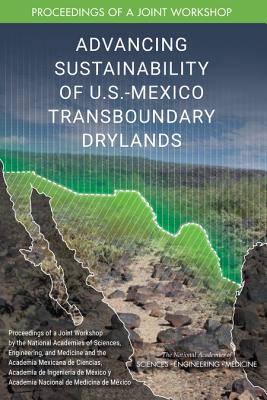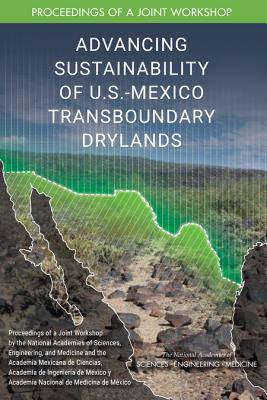
- Retrait gratuit dans votre magasin Club
- 7.000.000 titres dans notre catalogue
- Payer en toute sécurité
- Toujours un magasin près de chez vous
- Retrait gratuit dans votre magasin Club
- 7.000.0000 titres dans notre catalogue
- Payer en toute sécurité
- Toujours un magasin près de chez vous
Advancing Sustainability of U.S.-Mexico Transboundary Drylands
Proceedings of a Workshop
Academia Mexicana de Ciencias Academia de Ingeniería de México Y, National Academies of Sciences Engineering and Medicine, Division on Earth and Life Studies, Water Science and Technology Board, Board on Atmospheric Sciences and Climate, Division of Behavioral and Social Sciences and Education, Board on Environmental Change and SocietyDescription
The drylands region shared by the United States and Mexico currently faces multiple sustainability challenges at the intersection of the human and natural systems. Warming and drying conditions threaten surface water and groundwater availability, disrupt land- and marine-based livelihood systems, and challenge the sustainability of human settlements. These biophysical challenges are exacerbated by a highly mobile and dynamic population, volatile economic and policy conditions, increased exposure to extreme events, and urbanization on marginal, vulnerable lands.
The U.S. National Academies of Sciences, Engineering, and Medicine collaborated with the Mexican Academy of Sciences, Academy of Engineering, and the National Academy of Medicine to plan a 2-day binational workshop, Advancing Sustainability of U.S.-Mexico Transboundary Drylands. The workshop goals were to highlight the challenges facing the region, assess the scientific and technical capacity that each nation can bring to bear in addressing these challenges, and identify new opportunities for binational research collaboration and coordinated management approaches in the advancement of sustainability science and development. This publication summarizes the presentations and discussions from the workshop.
Spécifications
Parties prenantes
- Auteur(s) :
- Editeur:
Contenu
- Nombre de pages :
- 80
- Langue:
- Anglais
Caractéristiques
- EAN:
- 9780309484244
- Date de parution :
- 27-01-19
- Format:
- Livre broché
- Format numérique:
- Trade paperback (VS)
- Dimensions :
- 150 mm x 224 mm
- Poids :
- 136 g

Les avis
Nous publions uniquement les avis qui respectent les conditions requises. Consultez nos conditions pour les avis.






